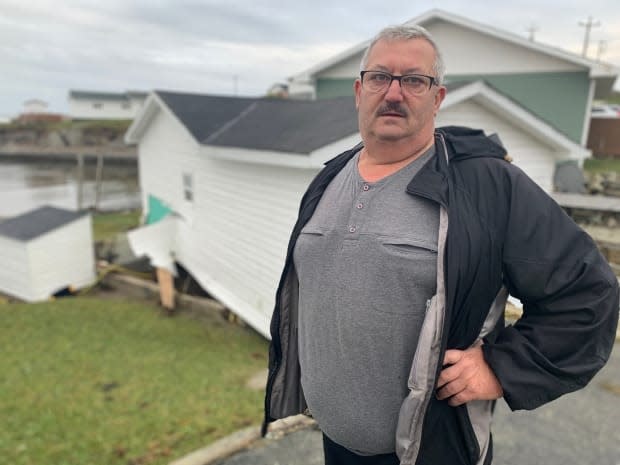Body of missing woman found as southwestern Nfld. grapples with Fiona aftermath

Officials with the RCMP have recovered the body of the missing woman with the assistance of the Canadian Coast Guard and the Stephenville and Barachois Search and Rescue teams.
In a statement, police said the body was found shortly before 4 p.m.
More to come
Residents in southwestern Newfoundland are dealing with the aftermath of post-tropical storm Fiona, which destroyed more than 20 homes and has displaced hundreds of people.
The damage in Port aux Basques was striking on Sunday morning, with boulders and debris scattered across the community.
Residents were using shovels to dig through the rubble, looking for anything salvageable. Some have lost everything — including heirlooms and family photos. One woman ran away from her home sobbing, unable to bear the devastation any longer.
On Sunday afternoon, the RCMP issued a press release confirming an ongoing search for a missing 73-year-old woman in Port aux Basques.
Later, at a press conference held by Minister of Justice and Public Safety John Hogan and Minister of Transportation and Infrastructure Elvis Loveless in St. John's, the search has officially become a recovery operation.

Derek Kettle, a Port aux Basques resident, said he doesn't know what he's going to do.
He owns two small apartment buildings near the coast on Mouse Island, an area in the town. He said the tenant in one of the buildings, which is two storeys, attempted to weather out the storm on the upper floor of the building — but soon, waves began crashing against the window, which is about 10 metres above sea level.
On Sunday morning, the bottom floor was covered in seaweed, dirt and debris.

The storm surge knocked Kettle's other apartment building, which is one storey, off its foundation and onto its side.
He said he's put hundreds of thousands of dollars into the buildings, which he rents out as Airbnbs and apartments. He said the buildings are the only source of income for him and his wife, and now his livelihood has been swept away — literally.
Catastrophic damage
On Sunday morning, CBC meteorologist Ashley Brauweiler said while the winds in Port aux Basques were significant, the bulk of the damage was caused by storm surge.
"When it came in, it came in so fast," she said.
She said models predicted 16 metre waves, but the maximum wave height may have been double.
"All of that combined was catastrophic," she said.
Brauweiler said residents have been in shock, and some on Sunday still won't even be able to access their homes — or whatever is left — because some areas are still inaccessible.
Environment Canada meteorologist Melissa Field said the storm set a record-high for water levels in Port aux Basques at 2.73 metres — about a metre higher than the normal water level.
Field said on Saturday, peak gusts of wind reached 177 km/h in the Wreckhouse area, 134 km/h in Port aux Basques, 110 km/h in Burgeo and 109 in Stephenville.
She said about 77 millimetres of rain fell in the Port aux Basques and Wreckhouse areas, just over 47 millimetres fell in the Stephenville area and just over 30 fell in the Burgeo area.
'I have never seen this kind of destruction'
Stephen Hiscock with the Burgeo Broadcasting System said the town of Burgeo has suffered significant damage, though not on the same level as Port aux Basques.
"It's been a pretty crazy day for everyone, especially for people in Port aux Basques, but people are still hurting here in Burgeo as well," he said.

He said one home was almost lost, but made it through the storm.
"I have never seen this kind of destruction on the south coast of Newfoundland," he said.
Hundreds of Newfoundland Power customers in southwestern Newfoundland were without power on Sunday morning.
Ian Stewart, mayor of Ramea, an island community off the south coast of Newfoundland, said the town is cleaning up debris and assessing damage on Sunday morning. He said the town has never seen a storm as intense as post-tropical storm Fiona.
"it's pretty incredible," he said.
Stephenville Mayor Tom Rose said post-tropical storm Fiona was the scariest storm he's ever seen. He said the town mitigated most severe damage, but had to evacuate one home before a tree fell on top of it.
He said the town has offered its help to Andrew Parsons, the MHA for the Port aux Basques area.
Rose said the devastation wreaked by the storm shows the increasingly severe impact of climate change.
"If we don't take care of the planet the planet will take care of us," he said.

The beginning of the rebuild
Minister of Industry, Energy and Technology, Andrew Parsons, who is from Port aux Basques and heading back to the region, told CBC News on Sunday that the community finds itself in a state of shock.
"It's a disaster like we've never seen before," said Parsons. "I don't think any of us [were] prepared or have seen anything like this."
"Everybody is on deck saying 'whatever can be done, will be done,'" said Parsons. "Right now, I think it's a case of assessing the damage, assessing the totality of it. I think we're just focused on recovery. We're just trying to connect people with who they need to be connected with. Figure out who is displaced, who needs help. It's the beginning of the recovery."
WATCH | CBC's Ashley Brauweiler details Fiona's destrucion

